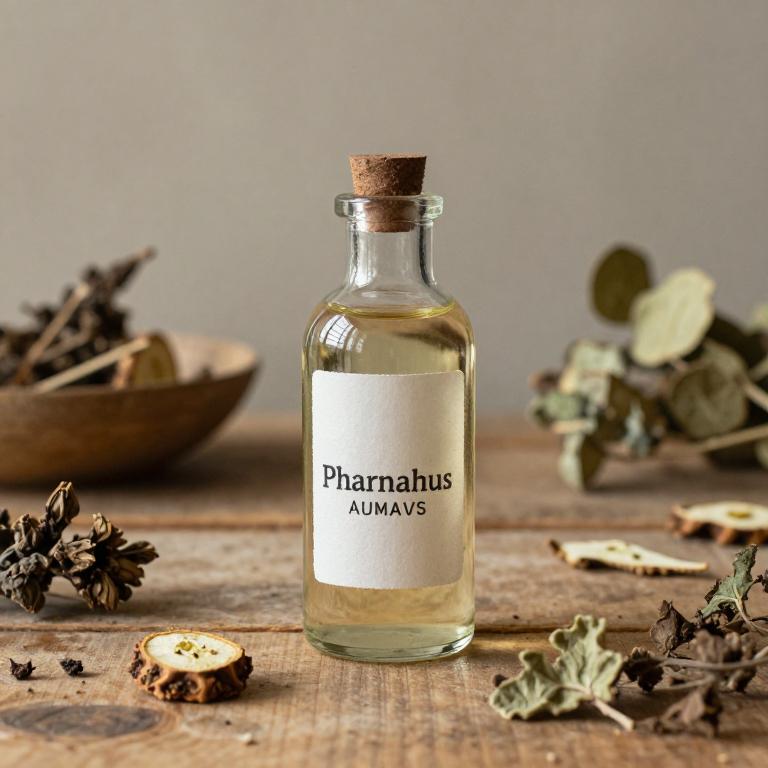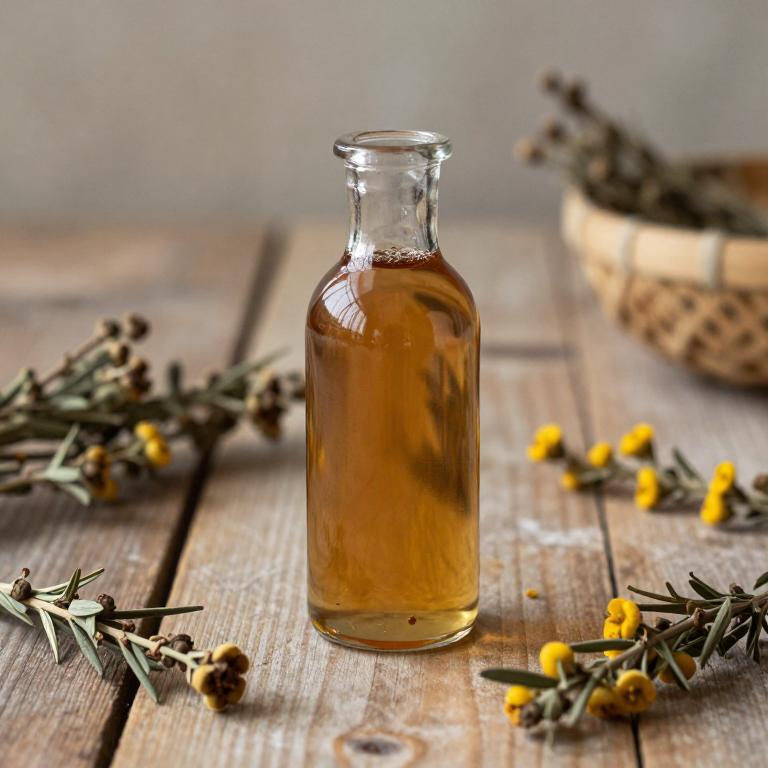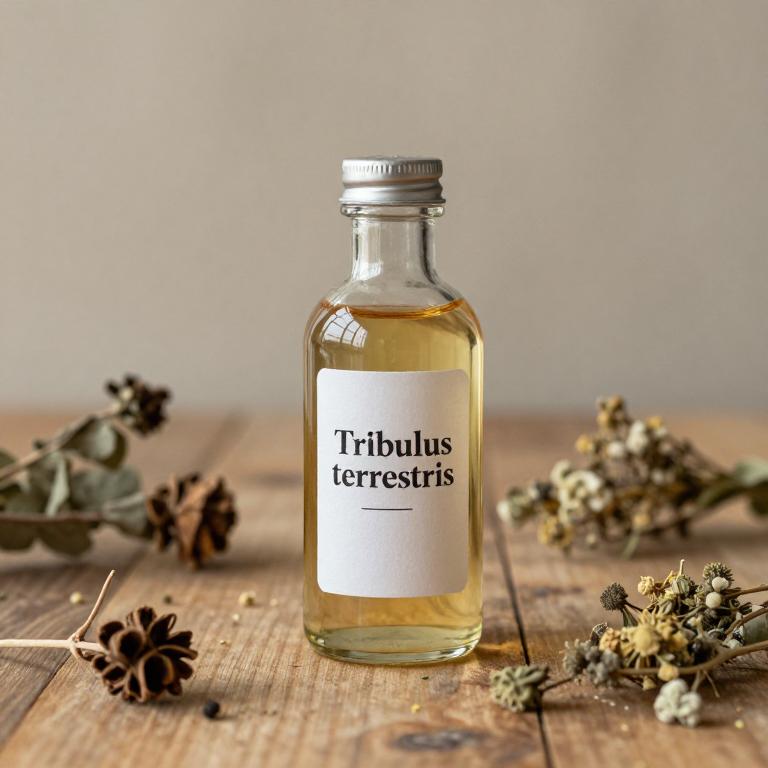10 Best Herbal Syrups For Jaundice

Herbal syrups for jaundice are traditional remedies that aim to support liver function and promote the elimination of bilirubin from the body.
These syrups often contain a blend of natural herbs such as dandelion, milk thistle, and turmeric, which are believed to have hepatoprotective properties. They are commonly used in Ayurvedic and Chinese medicine to address liver disorders and associated symptoms like yellowing of the skin and eyes. While some studies suggest potential benefits, it is important to consult a healthcare professional before using herbal syrups, as they may interact with other medications or have side effects.
Overall, herbal syrups can be a complementary approach to managing jaundice, but they should not replace conventional medical treatment.
Table of Contents
- 1. Thistle (Silybum marianum)
- 2. Turmeric (Curcuma longa)
- 3. Ginger (Zingiber officinale)
- 4. Licorice (Glycyrrhiza glabra)
- 5. Kalmegh (Andrographis paniculata)
- 6. False leaf (Phyllanthus amarus)
- 7. Indian barberry (Berberis aristata)
- 8. Puncture vine (Tribulus terrestris)
- 9. Tamarind (Tamarindus indica)
- 10. Aloe vera (Aloe barbadensis)
1. Thistle (Silybum marianum)

Silybum marianum, commonly known as milk thistle, is a herbal remedy that has been traditionally used to support liver health.
Its active compound, silymarin, is believed to have antioxidant and anti-inflammatory properties that may help protect liver cells from damage. Silybum marianum herbal syrups are often used as a complementary therapy for conditions like jaundice, which is characterized by yellowing of the skin and eyes due to elevated bilirubin levels. These syrups are typically made by extracting the seeds of the plant and combining them with a sweetener and water, making them easy to consume.
While some studies suggest potential benefits for liver function, it is important to consult a healthcare professional before using silybum marianum, especially for individuals with pre-existing health conditions or those on medication.
2. Turmeric (Curcuma longa)

Curcuma longa, commonly known as turmeric, has been traditionally used in herbal medicine for its anti-inflammatory and antioxidant properties.
Curcuma longa herbal syrups are often prepared by extracting the active compound curcumin from the rhizome of the plant. These syrups are used in some traditional systems of medicine to support liver function and aid in the treatment of jaundice, a condition characterized by yellowing of the skin and eyes due to elevated bilirubin levels. However, while curcumin shows promise in promoting liver health, scientific evidence supporting its efficacy for jaundice is limited and more research is needed.
It is important to consult a healthcare professional before using curcuma longa syrups, especially for individuals with pre-existing liver conditions or those taking other medications.
3. Ginger (Zingiber officinale)

Zingiber officinale, commonly known as ginger, has been traditionally used in herbal medicine for its various health benefits, including its potential role in treating jaundice.
Ginger contains bioactive compounds such as gingerol and shogaol, which may help in reducing inflammation and supporting liver function. Herbal syrups made from ginger are often prepared by combining fresh or dried ginger with honey or other natural sweeteners to enhance flavor and bioavailability. These syrups are believed to aid in the detoxification process and may help in the management of jaundice by promoting bile production and liver health.
However, while ginger is generally safe, it is advisable to consult a healthcare professional before using it as a treatment for jaundice, especially in severe cases.
4. Licorice (Glycyrrhiza glabra)

Glycyrrhiza glabra, commonly known as licorice root, has been traditionally used in herbal medicine for its potential hepatoprotective properties.
Herbal syrups made from glycyrrhiza glabra are often used in the management of jaundice due to their anti-inflammatory and antioxidant effects, which may support liver function. These syrups contain glycyrrhizin, a compound believed to help in the detoxification process and the reduction of liver inflammation. However, prolonged use of licorice-based syrups can lead to side effects such as hypertension and electrolyte imbalances, so it is important to use them under medical supervision.
While some studies suggest potential benefits, more clinical research is needed to fully establish the efficacy and safety of glycyrrhiza glabra syrups in treating jaundice.
5. Kalmegh (Andrographis paniculata)

Andrographis paniculata, commonly known as "Kalmegh," is a traditional medicinal herb widely used in Ayurvedic and Chinese medicine for its potent anti-inflammatory and hepatoprotective properties.
Herbal syrups made from Andrographis paniculata are often prescribed to support liver function and aid in the treatment of jaundice by promoting the detoxification process and enhancing bile production. These syrups contain active compounds such as andrographolide, which have been shown to reduce bilirubin levels and improve liver enzyme function. While they are considered a natural remedy, it is important to consult a healthcare professional before using them, especially for individuals with pre-existing liver conditions or those on other medications.
Overall, Andrographis paniculata herbal syrups may offer a supportive role in managing jaundice when used as part of a comprehensive treatment plan.
6. False leaf (Phyllanthus amarus)

Phyllanthus amarus, commonly known as the stone apple or ecballium, is a traditional herb widely used in Ayurvedic medicine for its detoxifying properties.
Herbal syrups made from Phyllanthus amarus are believed to support liver function and aid in the treatment of jaundice by promoting the elimination of bilirubin from the body. These syrups are often prepared by drying and grinding the plant parts, then mixing them with honey or sugar to create a palatable formulation. They are typically recommended alongside a healthy diet and lifestyle to enhance their efficacy.
While some studies suggest potential benefits, it is important to consult a healthcare professional before using Phyllanthus amarus syrup, especially for chronic or severe cases of jaundice.
7. Indian barberry (Berberis aristata)

Berberis aristata, commonly known as Indian barberry, contains active compounds like berberine that have been traditionally used for their anti-inflammatory and hepatoprotective properties.
Herbal syrups made from Berberis aristata are often prescribed in Ayurvedic and traditional medicine systems to support liver function and aid in the treatment of jaundice. These syrups work by promoting the detoxification process and enhancing the liver's ability to process bilirubin, which is crucial in managing jaundice. However, it is important to consult a healthcare professional before using these syrups, as they may interact with other medications or have side effects in certain individuals.
Despite their traditional use, scientific research on their efficacy for jaundice is still ongoing, and they should be used as a complementary therapy rather than a replacement for conventional medical treatment.
8. Puncture vine (Tribulus terrestris)

Tribulus terrestris, commonly known as puncture vine, has been traditionally used in herbal medicine for various health conditions, including jaundice.
Herbal syrups made from Tribulus terrestris are believed to support liver function by promoting detoxification and improving bile flow, which can help reduce jaundice symptoms. These syrups are often prepared by extracting the plant's active compounds through steam distillation or alcohol extraction to preserve their therapeutic properties. While some studies suggest potential hepatoprotective effects, more clinical research is needed to fully understand their efficacy and safety in treating jaundice.
As with any herbal remedy, it is important to consult a healthcare professional before using Tribulus terrestris syrups, especially for individuals with pre-existing liver conditions or those on medication.
9. Tamarind (Tamarindus indica)

Tamarindus indica, commonly known as tamarind, has been traditionally used in herbal medicine for its potential benefits in treating jaundice, a condition characterized by yellowing of the skin and eyes due to elevated bilirubin levels.
The syrup derived from tamarind is believed to support liver function and aid in the detoxification process, thereby helping to reduce bilirubin levels in the bloodstream. In Ayurvedic and other traditional systems of medicine, tamarind is often combined with other herbs to enhance its therapeutic effects for liver-related ailments. While some studies suggest that tamarind may have hepatoprotective properties, more clinical research is needed to fully understand its efficacy and safety in treating jaundice.
As a complementary therapy, tamarind-based syrups may be used under the guidance of a healthcare professional to support overall liver health.
10. Aloe vera (Aloe barbadensis)

Aloe barbadensis, commonly known as aloe vera, has been traditionally used in herbal medicine for its potential health benefits, including its use in treating jaundice.
While scientific evidence on its effectiveness for jaundice is limited, some studies suggest that aloe vera may support liver function due to its antioxidant and anti-inflammatory properties. Herbal syrups made from aloe barbadensis are often prepared by combining the gel with honey or other natural sweeteners to enhance palatability. These syrups are believed to aid in detoxification and may help reduce the buildup of bilirubin, a key factor in jaundice.
However, it is important to consult a healthcare professional before using aloe-based remedies, as they may interact with medications or have side effects in certain individuals.